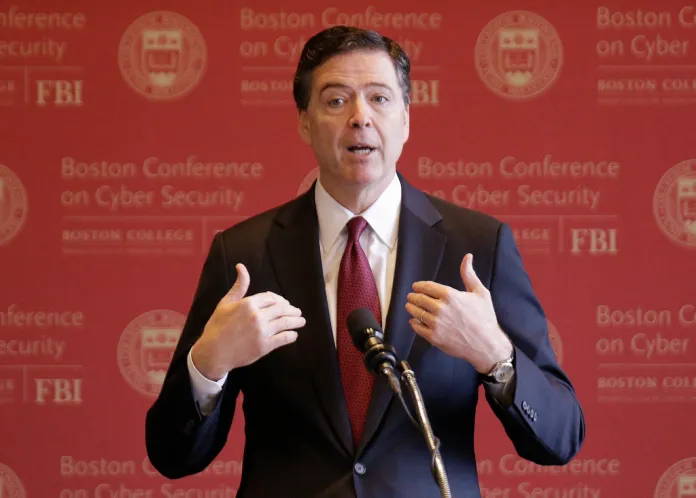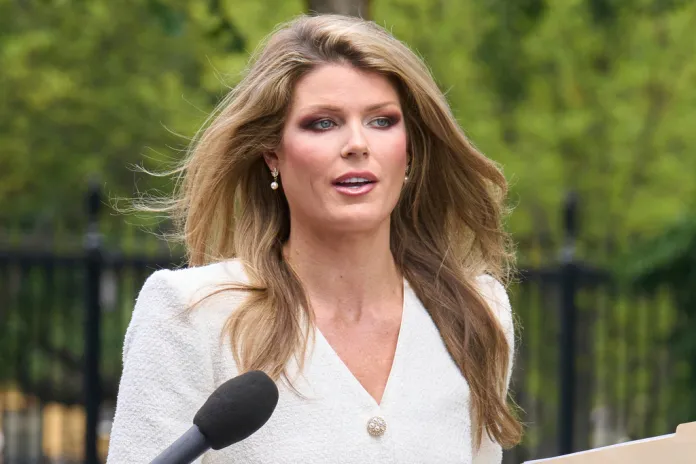ALEXANDRIA, Virginia — Whether President Donald Trump dislikes James Comey is irrelevant to the question of dismissing the two-count indictment against the former FBI director, federal prosecutors argued in court Wednesday morning.
The hearing in Alexandria, Virginia, was the latest step in Comey’s effort to throw out the charges on the grounds that the prosecution is a politically driven act of retaliation orchestrated by the president. Comey’s attorneys argue he was targeted because he publicly criticized Trump and resisted political pressure during his tenure at the FBI. Prosecutors countered that Comey was charged “simply for lying to Congress,” not because the president harbors long-standing animus toward him.

Justice Department attorney Tyler Lemons told U.S. District Judge Michael Nachmanoff that the defense was making “inferential leaps” and had not shown evidence that Trump directed the case. “He was not indicted at the direction of the president of the United States,” Lemons said, adding that interim U.S. Attorney Lindsey Halligan, who obtained an indictment days after her appointment, “was not a puppet” of the president to pursue his political enemies.
Comey’s attorney, Michael Dreeben, insisted the record demonstrates the opposite.
“The president of the United States has caused the executive branch to prosecute a perceived enemy,” he said, pointing to Trump’s September Truth Social post telling Attorney General Pam Bondi that “we can’t delay any longer” over cases involving Comey, New York Attorney General Letitia James, and Sen. Adam Schiff (D-CA). Dreeben said Trump had already forced out the previous U.S. attorney, Erik Siebert, after Siebert resisted bringing politically charged cases and appointed Halligan, who had no prosecutorial experience, in his place.
“If that’s not a direction to prosecute, I’m not really sure what is,” Dreeben told the court.
Defense filings assert that “objective evidence establishes that President Trump directed the prosecution of Mr. Comey in retaliation for Mr. Comey’s public criticisms and to punish Mr. Comey because of personal spite.” They argue that the case would “likely not have been brought” but for “the intervention of the President himself.”
Comey’s team has compiled more than 200 of Trump’s comments about the former FBI director, including the message calling on Bondi to act, which was reportedly intended to be private.
Prosecutors urged the court to reject the defense’s narrative about how the indictment came together. In written arguments, they said Trump’s posts merely reflect his belief that Comey committed crimes and that “personal dislike does not equate to legal prejudice.” They emphasized that the charges, one count of false statements and one count of obstruction, involve Comey’s 2020 Senate testimony about whether he authorized leaks to the press.
“The Executive cannot be expected to ignore agency heads lying about official actions simply because they later become outspoken critics,” the DOJ wrote in court filings. Prosecutors also argued that Halligan’s decisions reflected her own judgment and not Trump’s, saying her presentation of the case to the grand jury “does not demonstrate animus.”

Nachmanoff pressed Lemons on one of the core factual disputes: whether career prosecutors in the office initially recommended against bringing the case. “Was there a declination memo?” the judge asked. Lemons initially said he did not “know the world of what documents exist,” prompting Nachmanoff to ask whether he had even sought to find out. Lemons later admitted that he looked into the matter but was bound by instructions from Deputy Attorney General Todd Blanche’s office not to disclose the answer.
“I am aware of various draft memos,” he told the court, but he said he could not say more.
Only later in the hearing did the dispute over the grand jury process surface. Halligan, Trump’s handpicked interim U.S. attorney, acknowledged that the full grand jury did not see the final version of the indictment pending against Comey and that only the foreperson and one additional juror reviewed the altered charging document. Halligan said the full panel had previously reviewed an earlier version but conceded the revised indictment was taken directly to the magistrate’s courtroom for signature.
Nachmanoff appeared troubled that the final indictment had not been presented to the full panel, asking both prosecutors whether the procedure complied with grand jury requirements. Comey’s attorneys argued the concession means “there is no indictment,” noting that the statute of limitations has now expired.
Halligan’s conduct is separately under scrutiny from Magistrate Judge William Fitzpatrick, who earlier this week wrote that Comey had made a “particularized and factually based showing” that irregularities may justify dismissing the indictment. Fitzpatrick cited “fundamental misstatements of the law” by Halligan and raised concerns that the indictment returned in open court was not the same document the grand jury deliberated upon. Nachmanoff delayed Fitzpatrick’s order requiring the DOJ to hand over grand jury audio, saying he would hear objections from the government by Wednesday afternoon and a response from the defense by Friday.
JUDGE ORDERS DOJ TO TURN OVER GRAND JURY MATERIALS TO COMEY, CITING POSSIBLE ‘MISSTEPS’
The stakes for the selective and vindictive motions hearing extend beyond Comey. The indictment against the New York attorney general, also brought by Halligan, is now intertwined with a separate challenge to Halligan’s legal authority. Judge Cameron McGowan Currie is weighing whether Halligan’s appointment as interim U.S. attorney was lawful, a ruling she has said she will issue before Thanksgiving. James, who has pleaded not guilty to bank fraud and false statements charges concerning her residence in Norfolk, Virginia, is scheduled for her own selective and vindictive prosecution hearing the week after Thanksgiving.
Comey, who pleaded not guilty in October, is scheduled for trial on Jan. 5, 2026. Nachmanoff said he would not issue any ruling on Wednesday, telling the courtroom that “the issues are too wavy and too complex.”
